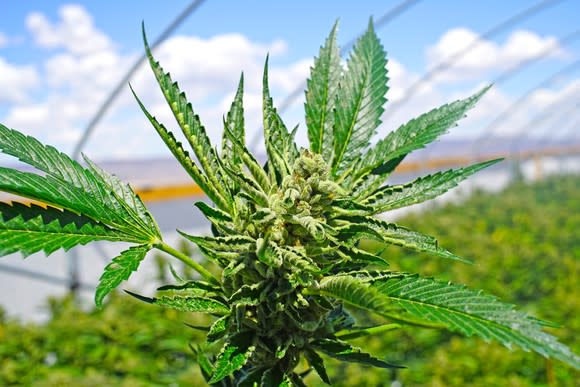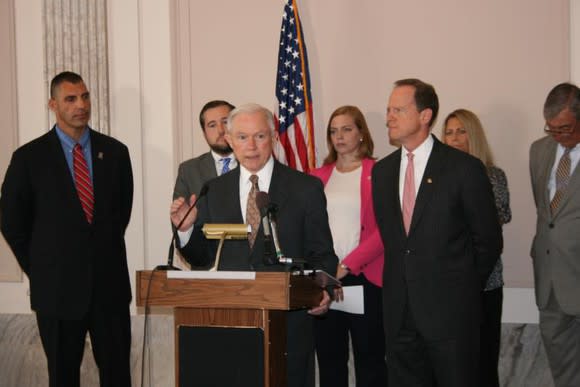Jeff Sessions May Be 6 Days From Declaring War on the Marijuana Industry
When it comes to the fastest-growing industries in the United States, legal marijuana is certainly in the discussion, if not at the top of the list. According to Marijuana Business Daily's latest report, "Marijuana Business Factbook 2017," U.S. legal weed sales are expected to increase 30% this year and 45% in 2018, and to quadruple between 2016 and 2021 to $17 billion. That type of growth is a big reason why marijuana stocks have doubled or tripled in value over the trailing year.
But it's not just sales growth that's been impressive -- it's the shift that underlies cannabis's expansion. An October-released Gallup poll showed that an all-time record 64% of respondents now want to see pot legalized nationally. This is up from just 25% in 1995, the year before California became the first state to legalize medical cannabis for compassionate-use patients. Even stronger favorability is seen with medical cannabis. A survey conducted by the independent Quinnipiac University this April showed that an overwhelming 94% support legalizing medical pot, compared to just 5% who oppose the idea.

Image source: Getty Images.
Sessions loathes the marijuana industry but has been kept at bay
But not everyone is on board with the expansion of cannabis in the United States. Attorney General Jeff Sessions just might be the most ardent opponent of marijuana in the country. Having previously said that "good people don't smoke marijuana," Sessions has argued on numerous occasions that marijuana use isn't a viable substitute for opioids and that pot use correlates with increased crime rates. He has also leaned on the fact that marijuana is still a schedule I drug at the federal level, meaning that it has no recognized medical benefits and is wholly illegal, just like heroin and LSD.
However, medical and recreational pot businesses have taken solace in the fact that both the Cole Memo and Rohrabacher-Farr Amendment have thus far protected their right to operate in the 29 states that have legalized medical cannabis and eight states that voted to green-light recreational weed.
The Cole Memo, named after former Deputy Attorney General James Cole, who served under Barack Obama, outlines a series of "rules" that states have to follow in order for the federal government to maintain a hands-off approach. These rules include ensuring that minors don't gain access to pot, that drivers under the influence of cannabis are dealt with harshly, and that cannabis grown within a state stays within that state.

Image source: Getty Images.
Meanwhile, the Rohrabacher-Farr Amendment, which was introduced in 2014 and has been included in every budget proposal since, disallows the Justice Department from using federal funds to prosecute marijuana businesses operating in the aforementioned 29 states.
But these protections may soon disappear, allowing Sessions to officially declare war on the U.S. pot industry.
Is this the end of the green rush in the U.S.?
In September, Congress narrowly avoided a government shutdown by lifting the debt ceiling and passing a budget extension through Dec. 8, 2017. However, talks to formulate a new budget, or at least another extension, haven't gone well in recent weeks. In just six days, the deadline could be hit without a new budget, leading to a government shutdown.
But there's even more at stake for the marijuana industry.
Back in September, the House Rules Committee blocked a vote on the Rohrabacher-Blumenauer Amendment (this is the same as the Rohrabacher-Farr Amendment), which would provide protections for pot businesses against federal prosecution. Keeping this amendment out of the House GOP's budget proposal is bad news, but it's certainly not the end of the world for the industry. As long as the Senate includes the amendment in its budget proposal, the pot industry would still be protected. Yet, as noted, the Senate and House, as well as Democrats and Republicans, aren't seeing eye to eye. If Dec. 8 passes without a deal, or if the Senate introduces a budget proposal that also excludes the Rohrabacher-Blumenauer Amendment, Sessions would be free to wage war on the marijuana industry and begin prosecuting companies. In other words, he could use federal dollars to go after marijuana businesses.

Image source: Jeff Sessions' Senate webpage.
Furthermore, Sessions recently announced that the Justice Department would halt the practice of guidance memos and is reviewing the Obama administration's guidance memos, including the Cole Memo, to see if the administration overstepped its bounds.
While it's tough to tell exactly how Sessions would approach reinstituting federal law, the assumption is that he would first tackle the largest offenders (i.e., the largest marijuana grow farms). This would suggest that smaller grow farms and dispensaries would possibly be off the radar for some time, but it would be a crushing defeat for big business and investors who've taken a chance on marijuana stocks.
In other words, let the nail-biting begin for U.S.-based pot companies and marijuana-stock investors.
More From The Motley Fool
6 Years Later, 6 Charts That Show How Far Apple, Inc. Has Come Since Steve Jobs' Passing
Why You're Smart to Buy Shopify Inc. (US) -- Despite Citron's Report
The Motley Fool has a disclosure policy.
